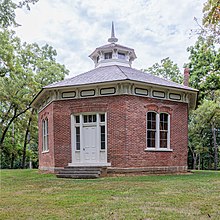Watkins Woolen Mill State Park and State Historic Site
Watkins Mill in Lawson, Missouri, United States, is a preserved woolen mill dating to the mid-19th century. The mill is protected as Watkins Woolen Mill State Historic Site, which preserve its machinery and business records in addition to the building itself. It was designated a National Historic Landmark and added to the National Register of Historic Places in 1966 in recognition for its remarkable state of preservation.[4] The historic site is the centerpiece of Watkins Mill State Park, which is managed by the Missouri Department of Natural Resources.[7]
| Watkins Mill State Park and Watkins Woolen Mill State Historic Site | |
|---|---|
 Watkins Mill | |
| Location | Lawson, Clay County, Missouri, United States |
| Coordinates | 39°24′04″N 94°15′37″W / 39.40111°N 94.26028°W[1] |
| Area | 1,500.22 acres (6.0712 km2)[2] |
| Elevation | 896 ft (273 m)[1] |
| Established | 1964[3] |
| Visitors | 520,728 (in 2017)[2] |
| Governing body | Missouri Department of Natural Resources |
| Website | Watkins Mill State Park |
Watkins Mill | |
 The Octagonal Schoolhouse at Watkins Mill | |
| Nearest city | Excelsior Springs, Missouri |
| Area | 560 acres (230 ha) |
| Built | 1860 |
| Architect | Waltus Watkins |
| NRHP reference No. | 66000416 |
| Significant dates | |
| Added to NRHP | November 13, 1966[4] |
| Designated NHL | November 13, 1966[5] |
| Designated NHLD | September 28, 1983[6] |


History
editWaltus L. Watkins established the 80-acre livestock farm he called Bethany Plantation in 1839.[8] Watkins Mill was built in 1859-1860. Watkins built housing for the mill workers nearby, creating one of the first planned communities in North America. The community was effectively self-sufficient, the mill producing yarn and wool cloth. The mill operated at capacity until 1886, two years after Watkins' death. From 1886 to the turn of the twentieth century production declined. Nearly all of the mill machinery has been preserved, including a 65-horsepower steam engine that powered the factory.[6]
The site also includes the Watkins house, dating to 1850. The twelve-room, 2½-story house includes three staircases, the main stair detailed in carved walnut. It remained a Watkins family home until 1945.[6]
The Franklin School, or Octagonal School, is an octagonal schoolhouse built in 1856 and used by the Watkins family and their employees until the mid-1870s, when it became a residence for mill workers. The unusual octagonal building was built of locally manufactured brick on Watkins land.[6]
The Watkins family also donated the land for Mt. Vernon Baptist Church, built in 1871 to replace a log church dating to the 1850s. Of the $5000 construction cost, more than half was donated by Watkins.[6]
After going through several changes in ownership, the state of Missouri took possession of the property, creating a 1,442-acre (584 ha) state park in 1964.[8] It was named a National Mechanical Engineering Historic Landmark in 1980.[9]
State park
editThe recreation area of the state park has 96 campsites, most of which have electric hookups, and many of which are available year-round.[10] A 100-acre (40 ha) lake supports fishing for bass, catfish, crappie and sunfish and has a large sand swimming beach. A 3.8-mile (6.1 km) asphalt bicycling and walking trail follows the shoreline of the lake, and there is a separate 3.5-mile (5.6 km) equestrian trail.[7]
See also
editReferences
edit- ^ a b "Watkins Mill State Park". Geographic Names Information System. United States Geological Survey, United States Department of the Interior.
- ^ a b "Watkins Mill State Park and Watkins Woolen Mill State Historic Site: Data Sheet" (PDF). Missouri Department of Natural Resources. November 2017. Retrieved April 29, 2018.
- ^ "State Park Land Acquisition Summary". Missouri State Parks. Retrieved April 29, 2018.
- ^ a b "History". Watkins Mill Association. Retrieved April 29, 2018.
- ^ "Listing of National Historic Landmarks by State: Missouri" (PDF). National Park Service. Retrieved August 13, 2015.
- ^ a b c d e Lissandrello, Stephen (April 2, 1976). "National Register of Historic Places Inventory Nomination Form: Watkins Mill". National Park Service. Retrieved June 1, 2009. and accompanying photos.
- ^ a b "Watkins Mill State Park". Missouri Department of Natural Resources. Retrieved October 1, 2014.
- ^ a b "Watkins Mill State Park: Preamble for the Conceptual Development Plan". Missouri Department of Natural Resources. Retrieved October 1, 2014.
- ^ "Historic Site History at Watkins Woolen Mill State Historic Site". Missouri Department of Natural Resources. Retrieved August 13, 2015.
- ^ "Camping at Watkins Mill State Park". Missouri Department of Natural Resources. Retrieved October 1, 2014.
External links
edit- Watkins Mill State Park Missouri Department of Natural Resources
- Watkins Woolen Mill State Historic Site Missouri Department of Natural Resources
- Watkins Woolen Mill State Park and State Historic Site Map Missouri Department of Natural Resources
- Watkins Mill Association
- Historic American Engineering Record (HAER) No. MO-1, "Watkins Mill, County Highway MM, Lawson, Ray County, MO", 94 photos, 10 color transparencies, 82 data pages, 11 photo caption pages

